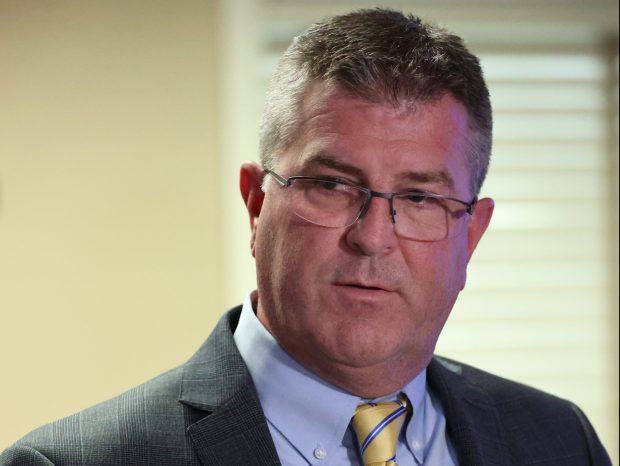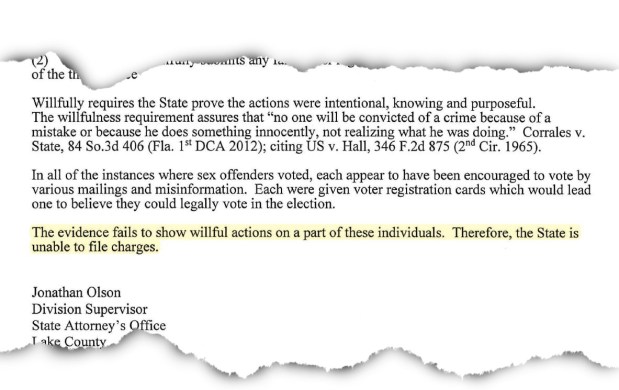Republican prosecutor declined to pursue cases similar to those brought by DeSantis’ election police
A Republican state attorney last May declined to prosecute six voter fraud cases that involved circumstances strikingly similar to the cases later brought against 20 ex-felons by Gov. Ron DeSantis’ election police unit and statewide prosecutors.
The office of State Attorney Bill Gladson, whose district includes The Villages and five Republican counties, confirmed six convicted sex offenders in Lake County had voted in the 2020 general election, according to a determination letter obtained by the Orlando Sentinel.
Gladson and his staff concluded, however, that the cases could not be prosecuted because the fraud was not willful — a rationale that attorneys say applies equally to many of the voter fraud cases currently being pursued by the Office of Statewide Prosecution.
In the year since the letter was written by a supervisor in Gladson’s office, no ex-felons in that circuit, including the six sex offenders, have been arrested for illegally voting, a felony charge punishable by $5,000 and up to 5 years in prison.
In August, 20 people living in majority Democrat counties were swiftly jailed in the first significant action taken by the Office of Election Crimes and Security, DeSantis’ new election police force. Each had voted despite being convicted of a felony sex offense or murder, which makes them ineligible to have their voting rights restored under Amendment 4.
They were each, however, cleared to cast a ballot by the state and were given voter ID cards – just as those identified as having voted illegally in Gladson’s district were.
Roger Weeden, a lawyer representing two people who were arrested by DeSantis’ election police, said it seems that sex offenders in Lake County have been given a pass while those in majority Democrat counties were not.
“I’m offended,” he said. “The people are similarly situated, and there is no factual way to differentiate between the cases and yet some people are being prosecuted under the same factual scenario and others are not.”
According to the letter, the Lake County Supervisor of Elections Office flagged the six cases for Gladson’s staff to review. A spokesperson for that agency in an unsigned statement said the state was notified about the cases, though “not by our office.” Gladson in an email said his office did not notify DeSantis’ office or state investigators about the cases.
Kylie Mason, a spokesperson for Attorney General Ashley Moody’s Office, in an email said the state “does not have any active prosecutions involving” the six sex offenders, who lived in Leesburg, Eustis, Clermont and Crystal River when they cast their ballots, according to records provided by the local elections office. Three were registered as Republicans and three were registered Democrats, according to public records.
An annual report by the Florida Department of State released in January said there were nine pending investigations and seven preliminary investigations into “unqualified electors willfully voting” in Gladson’s district. None, however, have been arrested.

‘Evidence fails to show willful actions’
The letter written in May 2022 by Jonathan Olson, an assistant state attorney in Gladson’s office, said, after finding out that six sex offenders had voted, office staff contacted the Florida Division of Elections “concerning the individuals receiving voter registration cards.”
The letter cited a statute requiring the state office to notify the local supervisor of elections office “if a person is ineligible to vote.”
“No such notices were given,” the letter said. “The individuals were mistakenly given voter registration cards.”
“In all of the instances where sex offenders voted, each appear to have been encouraged to vote by various mailings and misinformation,” the letter said, adding that the people were led “to believe they could legally vote in the election.”
“The evidence fails to show willful actions on the part of these individuals,” said the letter. “Therefore, the State is unable to file charges.”
Neither Gladson nor Olson wished to comment on the letter or the statewide prosecutor’s decision to pursue cases mirroring the ones they said were not provable beyond a reasonable doubt.

Since the highly-publicized arrests in August, voting rights advocates have argued the responsibility of determining a person’s eligibility to vote lies with the Secretary of State, Florida’s chief elections officer.
Statements from DeSantis-appointed officials have appeared to echo that sentiment, even as the state moves forward with the prosecutions.
In a letter to election supervisors across the state on the day of the arrests, Pete Antonacci, the DeSantis-appointed head of the Office of Elections Crimes and Security, wrote that it was “through no fault of your own” that the individuals “were registered to vote and voted in your county,” according to the Miami Herald.
Laurel Lee, the former secretary of state appointed by DeSantis, has also told the Miami Herald, Tampa Bay Times and ProPublica that it is solely the responsibility of the state to flag those who were ineligible to vote in 2020.
Representatives from the Florida Division of Elections, which is under the Department of State, however, have said the blame is on ex-felons who attested the following on their registration form: “I affirm that I am not a convicted felon, or if I am, my right to vote has been restored.”
Mark Ard, a spokesman for the Division of Elections, previously told the Sentinel the ex-felons “committed perjury” when signing up to vote.
In an email Friday, Ard said, of the six sex offenders, the election crimes office received only three names and referred them to the Florida Department of Law Enforcement. The Office of Election Crimes and Security only notifies other state agencies, like FDLE, of voter fraud after it has concluded that “criminality occurred,” he added.
Gretl Plessinger, an FDLE spokesperson, said the agency is reviewing allegations against the three sex offenders forwarded by the election crimes office, but has not begun any official investigation.
Ahead of the 2020 elections, about 260 registered sex offenders and 1,200 felons on probation were on the voter rolls even though they were ineligible to cast ballots, according to a review by the Miami Herald, Tampa Bay Times and ProPublica.
Court testimony from May 2020 also showed the state was struggling to review registered voters whose names and birthdates matched those of felons. The understaffed Division of Elections had a backlog of 85,000 files, according to federal court testimony from Maria Matthews, the director of the Division of Elections.
Lawyers: Cases are ‘political theater’
State Rep. Michael Gottlieb, a Fort Lauderdale attorney who is representing an ex-felon arrested in August, said, “Individuals throughout the state should be treated in a similar fashion, and so this just sort of highlights the inequities in the system.”
“Individuals in this case were chosen to not be prosecuted and the other defendants were prosecuted,” said Gottlieb, D-Davie. “There’s something wrong with that, especially when we’re using a state police force for political prosecutions.”
“Laws of the state of Florida, as well as the United States, are designed to protect everybody equally,” said Robert Barrar, an attorney representing a Miami man whose voter fraud case was dismissed. “How can some people be prosecuted and others not? Theoretically, everybody is entitled to equal protection under the law.”
Mark Rankin, a criminal defense attorney representing one of the arrested ex-felons, said the cases brought by DeSantis’ election police “are all nothing but political theater by the governor.”
“The cases are being brought by the Statewide Prosecutor’s Office for a reason – because most local elected State Attorneys would have refused to bring these cases because the defendants are not guilty of any crimes – and because they’re focused on real crimes that affect the community rather than political prosecutions meant to get headlines on Fox News,” Rankin said.
Orlando man arrested by DeSantis’ election police works to rebuild his life — again
The cases stemming from the initial batch of arrests in August are being pursued by the Office of Statewide Prosecution, led by Moody, an ally of DeSantis who has previously supported efforts to overturn the 2020 presidential election.
According to its website, the statewide prosecution office focuses “on complex, often large scale, organized criminal activity.” Of the 20 initial voter fraud cases taken up by Moody’s office, most have been either thrown out or ended in plea deals in which defendants were able to walk away with no penalties.
Each of the dismissed cases is expected to be appealed or re-submitted as the Legislature in February expanded jurisdiction in voter fraud cases to statewide prosecutors.
Since the initial arrests, the election police unit has only made four other arrests, according to an annual report by the Department of State.
DeSantis announced the initial arrests at a press conference in the Democrat stronghold of Broward County just five days before the 2022 primary election. The governor, flanked by uniformed officers, pronounced that more arrests would be imminent — with equal justice for anyone found to have voted illegally.
“We do have ongoing reviews at the state level,” DeSantis said. “When you start some prosecutions, you need to … focus on anyone that violated the law — we don’t want to be selective about it.”
ccann@orlandosentinel.com
This article has been archived for your research. The original version from Orlando Sentinel can be found here.
